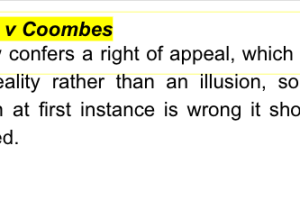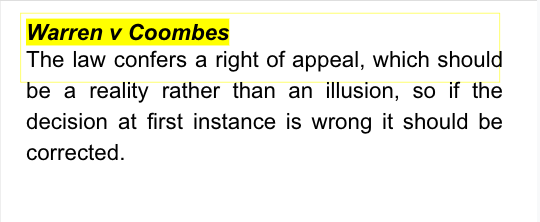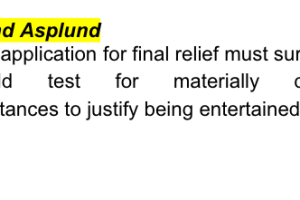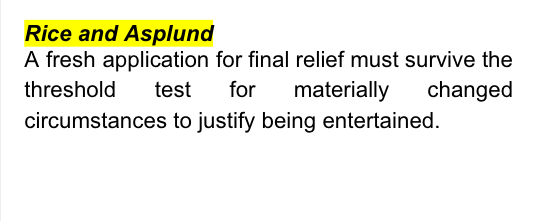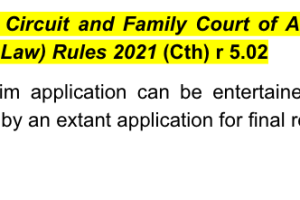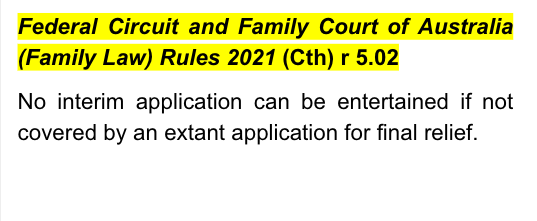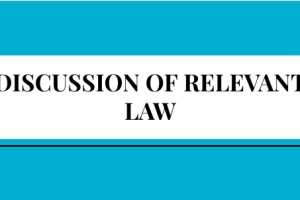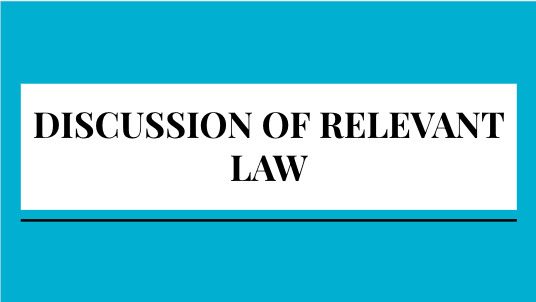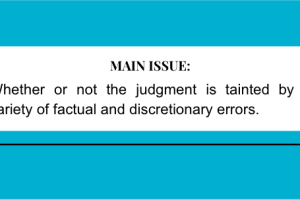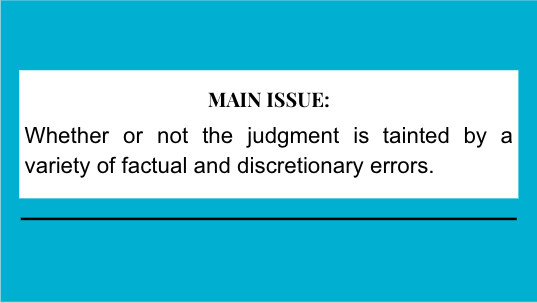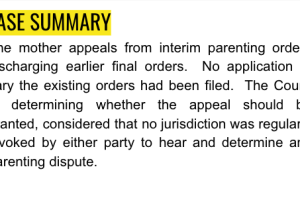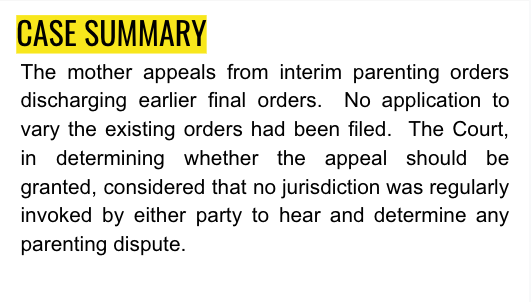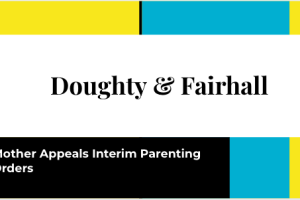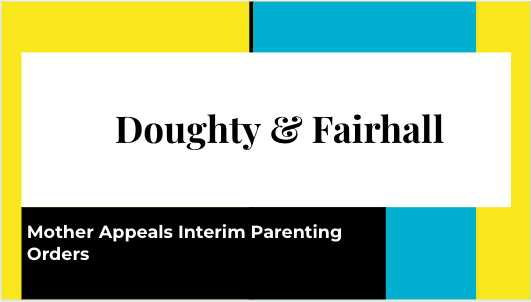- · 4812 friends
Mother Appeals Interim Parenting Orders

Doughty & Fairhall [2022] FedCFamC1A 150 (23 September 2022)

The mother appeals from interim parenting orders discharging earlier final orders. No application to vary the existing orders had been filed. The Court, in determining whether the appeal should be granted, considered that no jurisdiction was regularly invoked by either party to hear and determine any parenting dispute.

Facts
The mother appeals from interim parenting orders made on 20 May 2022 (amended on 30 May 2022 pursuant to the slip rule) by a judge of the Federal Circuit and Family Court of Australia. The orders concern the parties’ only child, born in 2015, who was aged seven years at the time the appealed orders were made. The appealed orders discharged some (but not all) final orders made nearly two years before in July 2020 (Order 6) and instead made provision for the child to spend time with the father on each alternate weekend in school terms and for portions of the school holidays (Order 1), with changeovers at prescribed venues (Orders 2 and 3).
Final orders concerning the child were made between the parties with their consent on 30 July 2020. The orders provided for the mother to have sole parental responsibility for the child, for the child to live with her, and for the child to spend time with the father on alternate Saturdays. The child ceased spending time with the father about six months later in or about January 2021, so the father filed an Application-Contravention in August 2021, which brought the dispute before the primary judge. Regardless of whether or not the mother was contravening the existing orders without reasonable excuse, as the father alleged, the child was not spending any time with him and so the existing orders were not being implemented.
The parties acknowledged the parenting orders needed revision, albeit in quite different ways, but neither had filed any application to achieve that objective. For reasons which are not entirely clear, her Honour put the contravention dispute to one side to instead focus upon the parties’ disagreement over the manner in which the existing parenting orders should be varied. On 30 March 2022, her Honour made some orders for the child to spend time with the father at certain designated times, which were intended to re-unite them pending the interim hearing, fixed for 20 May 2022. Other procedural orders required the parties to file interlocutory applications (respectively by an Application in a Proceeding and a Response) setting out the specific nature of the interim parenting relief they sought, but neither complied.
By 20 May 2022, there was still no formal application filed by either party to vary the existing orders. Despite the continuing absence of any application, the hearing proceeded. The mother proposed the child should spend only two hours each Friday evening with the father, whereas he proposed the child’s staged re-introduction to him, culminating in visits on alternate weekends and in school holidays, which regime was more expensive than the alternate Saturdays imposed by the orders made in July 2020. The primary judge gave ex tempore judgment and pronounced interim parenting orders, which instituted the expanded regime sought by the father – but immediately and without any graduation (Orders 1, 2, 3 and 6).
Leave was granted to the father to withdraw his pending contravention application (Order 8) and the proceedings were adjourned to November 2022 for “further consideration” (Order 9). On 13 July 2022, the primary judge made an order temporarily suspending the appealed orders, but made further procedural orders appointing an Independent Children’s Lawyer and instead adjourned the proceedings to 16 September 2022 for “further consideration”. The parties confirmed during the appeal hearing that the court event listed before her Honour on 16 September 2022 was adjourned. The current state of affairs is therefore governed by a residual rump of final orders made in July 2020, essentially providing for the child to live with the mother and for her to have sole parental responsibility for the child, but with fluxing interlocutory orders made in March 2022, May 2022 and July 2022 concerning the child’s future interaction with the father, without any application being formally made by either party to vary any of the orders made in July 2020.

Issue
Whether or not the judgment is tainted by a variety of factual and discretionary errors.

Applicable law



Analysis
No jurisdiction was regularly invoked by either party to hear and determine any parenting dispute – either on a final or interim basis. The parties could not be compelled by an order to commence litigation, which is a voluntary decision. Aside from the contravention application, no application for parenting orders had been filed before the procedural orders were made on 30 March 2022 and the parties’ respective refusal or failure to file any application for parenting orders in compliance with those procedural orders served to emphasise the absence of any justiciable dispute.
The parties were governed by the orders made consensually between them on 30 July 2020 and there were only two ways in which those orders could be revised and varied. First, an Initiating Application seeking fresh final relief under Pt VII of the Act had to be filed, but none was. Second, even if a fresh application for final relief had been or is later filed, it must survive the threshold test for materially changed circumstances to justify being entertained. The threshold test was not envisaged as being an impediment to the subsequent revision of the orders as, when they were made in July 2020, the orders were attended by a notation in these terms: "The mother undertakes not to object to the father seeking to revisit the orders on the grounds of the principle of Rice and Asplund filed on or after 1 November 2021."
The absence of any valid application to vary the existing orders was expressly discussed during the hearing in this way, but without any ancillary acknowledgement of the lack of jurisdiction to embark upon a review of the July 2020 orders.
Conclusion
The appeal is allowed. The Application in an Appeal filed on 12 September 2022 is dismissed. The appellant’s application for costs is dismissed. The parties’ applications for costs certificates in the appeal, pursuant to the Federal Proceedings (Costs) Act 1981 (Cth), are dismissed.


